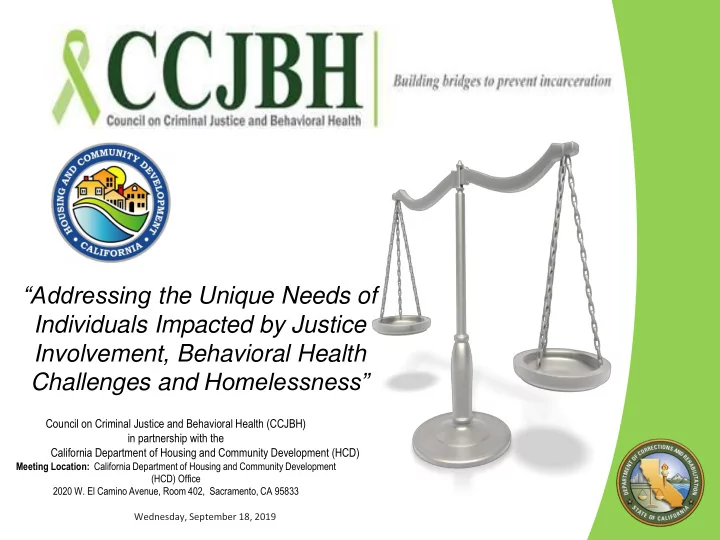

“Addressing the Unique Needs of Individuals Impacted by Justice Involvement, Behavioral Health Challenges and Homelessness” Council on Criminal Justice and Behavioral Health (CCJBH) in partnership with the California Department of Housing and Community Development (HCD) Meeting Location: California Department of Housing and Community Development (HCD) Office 2020 W. El Camino Avenue, Room 402, Sacramento, CA 95833 Wednesday, September 18, 2019
Co-Hosts Cathy Kungu , Sr. Housing Policy Specialist, Homelessness , California Department of Housing and Community Development (HCD) Stephanie Welch , Executive Officer Council on Criminal Justice and Behavioral Health (CCJBH) 2
Overview • Welcome, Introductions, Overview and Purpose • Panel Discussion on the Landscape of Homelessness 101: An Outlook on Serving the Justice Involved Population with Behavioral Health Needs – Partnerships, Opportunities and Challenges • Discussion with Workshop Attendees • Facilitated Discussion Regarding Recommendations to Addressing the Needs of Individuals, Justice Involved with Behavioral Health Needs Experiencing Homelessness or at Risk of Homelessness. 3
Introductions • Name • Organization • County, City or Region 4
Council on Criminal Justice and Behavioral Health CCJBH serves as a resource to assist and advise the Administration and Legislature on best practices to reduce the incarceration of youth and adults with mental illness and substance use disorders with a focus on prevention, diversion and reentry strategies. 12-Member Appointed Council Chair, Secretary of the California Department of Corrections and Rehabilitation (CDCR) and Vice-Chair, Department of Health Care Services (DHCS) Department of State Hospitals (DSH), and local experts from both criminal justice and behavioral health systems (e.g. Behavioral Health Directors, Judges, Probation, and Law Enforcement). 5
Goals for Today Purpose: Through dialogue with critical system partners in policy and program implementation, identify strategies to increase housing outcomes, and funding resources for justice-involved individuals experiencing behavioral health challenges. Outcome: Develop recommendations to improve housing outcomes for a CCJBH policy brief on the intersection of criminal justice, homelessness, and behavioral health. 6
Homelessness and Criminal Justice • Of the 11 million people admitted to jail annually … • About 15% report experiencing homelessness in the year prior to arrest. 1 • Rates of homelessness are higher among people who have mental illness and co- occurring substance use disorders . Source: Greg A. Greenberg and Robert A. Rosenheck , “ Jail Incarceration, Homelessness, and Mental Health: A National Study ” ( Psychiatry Services, 2008), available at ps.psychiatryonline.org/doi/full/10.1176/ps.2008.59.2.170 . 7
Homelessness and Criminal Justice Over 50,000 people enter homeless shelters directly from prison or jail each year 1 Since 2011, the number of people experiencing homelessness has fallen, while the number people entering homelessness from correctional institutions has risen 2 5.0% 0.0% -5.0% -10.0% 2011 2012 2013 2014 2015 2016 2017 Total People coming from Correctional Institutions Source: 1. Office of Planning and Development, “The 2017 Annual Homeless Assessment Report (AHAR) to Congress: Part 2: Estimates of H ome lessness in the United States,” U.S. Department of Housing and Urban Development, October 2018, https://www.hudexchange.info/resources/documents/2017-AHAR-Part-2.pdf 2. CSG Justice Center staff analysis of HUD AHAR data, 2019. 8
Housing Instability and Criminal Justice Involvement: A Cyclical Relationship 4. Lack of stable 1. Law enforcement policies and housing upon exit procedures that from jail contributes contribute to arrest to supervision failure, for behaviors increases risk of Lack of under erstan standing ding of associated with recidivism. true e scope ope of probl oblem, m, experiencing colla llabo borativ ive strat ateg egies, ies, and homelessness. investm estmen ent in effec ectiv ive e inter erven entio ions from the 3. Criminal history 2. Lack of stable homeless and criminal serves as a barrier to housing viewed as a systems housing, contributing risk factor and to housing instability reduces courts’ and homelessness. willingness to divert individuals from jail or prison. 9
Current Challenges Limited history of collaborative planning between criminal justice, behavioral health, and housing/homelessness agencies/sectors Lack of coordination and referral systems connecting criminal justice intercept points and housing Resources are scarce Significant barriers to an array of housing opportunities for people with justice histories exist and have not been addressed adequately, including enforcement of current laws 10
Current Opportunities Inform policymakers about the unique challenges of obtaining safe, affordable and permanent housing for individuals with justice involvement Identify specific ways to address these barriers as part of developing the statewide strategic plan to end homelessness Provide training and technical assistance to local CoCs and other housing service providers about the needs and strategies most effective with justice involved populations 11
Panel Discussion on the Landscape of Homelessness 101: An Outlook on Serving the Justice Involved Population with Behavioral Health Needs – Partnerships, Opportunities and Challenges Panelists: • Cindy Cavanaugh, Director of Homeless Initiatives, Sacramento County • Peter Lynn, Executive Director, Los Angeles Homeless Services Authority 12
Facilitated Discussion with Workshop Attendees Regarding the Following Questions: 1. What actions can the State take to ensure that the collaborations between criminal justice and the homelessness crisis response system produce positive housing outcomes? 2. What best practices should the State support to facilitate the housing of homeless individuals involved in the criminal justice system? 13
Facilitated Discussion with Workshop Attendees Regarding: Recommendations to Addressing the Needs of Individuals, Justice Involved with Behavioral Health Needs Experiencing Homelessness or at Risk of Homelessness 14
Thank You! Contact information: Stephanie.welch@cdcr.ca.gov (916) 324-7021 Catherine.Kungu@hcd.ca.gov (916) 263-2659 15
Recommend
More recommend